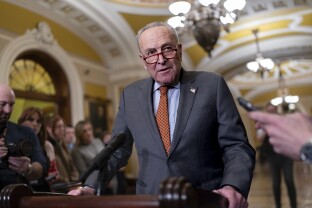The Senate passed a funding deal Monday night in a 60-40 vote, sending the bill across the Capitol in hopes that the House will quickly take up the legislation and end the longest-ever government shutdown.
Eight moderate senators — Democratic Sens. Dick Durbin, Catherine Cortez Masto, Maggie Hassan, Tim Kaine, Jacky Rosen, Jeanne Shaheen, John Fetterman and Independent Sen. Angus King, who caucuses with Democrats — joined most Republican senators to pass the deal they struck over the weekend. Many other Democrats, including Minority Leader Hakeem Jeffries, were furious the party caved without getting assurances on expiring Affordable Care Act subsidies, a key Democratic demand amid the shutdown fight. Democrats both inside and outside of the Capitol fumed at Minority Leader Chuck Schumer — even though he voted against the deal — for not keeping the caucus together.
The package includes a bipartisan minibus of three appropriations bills, a measure to rehire federal workers laid off during the shutdown and a continuing resolution to fund the government through Jan. 30.
Kaine told reporters Monday that the measure to reverse the shutdown layoffs is what finally sealed his vote for the deal.
“We get a guarantee of no RIFs into the future,” Kaine said. “[Employees] are looking at their inboxes every day to see whether they’re getting an email from the DOGE boys or somebody else telling them their career is over. That anxiety has been lifted.”
President Donald Trump told reporters before Monday’s vote that his administration also approved the package, and he hoped Congress could reach a different agreement on health care.
“I’ll abide by the deal. The deal is very good,” Trump said.
Senate Democrats are left to wait on one concession they received — a vote on Affordable Care Act subsidy extensions in December. Democratic Sen. Tina Smith told NOTUS it’s time for Democrats to move forward and focus on that fight, though she didn’t support the deal.
“Given that I lost this fight, I am trying to figure out how to keep this going in other ways,” Smith said. “Since it’s pretty much over, we should try to wrap it up so that people can get paid and we can move onto the next big battle.”
Both chambers of Congress have a lot on their plates after the package’s passage. Appropriator John Hoeven told reporters that the Senate has plans to tee up four more appropriations bills for consideration, including bills that fund defense, labor, health and human services and education agencies, transportation, housing and urban development, and agencies related to commerce, justice and science.
The bill passed Monday night now goes to the House, which hasn’t voted since Sept. 19 and is expected to come back by Wednesday in order to vote. Speaker Mike Johnson told members on Monday morning to start flying to Washington, and the House Freedom Caucus was already signaling support for the deal before it even passed the Senate.
Ahead of Monday’s vote, some Senate Republicans were hopeful about where negotiations on the ACA could lead.
“Here’s a positive: we’re having a conversation,” Republican Sen. Rick Scott told reporters before the vote. “[The president] is very engaged in trying to fix Obamacare. He knows it’s a disaster. I’ve talked to Democrats, they know the prices are too high.”
Sen. Richard Blumenthal said after the vote his anger was “really directed” at Republicans.
“We will be united in holding the Republicans to their promise that we have a vote to extend the health care subsidies,” Blumenthal said.
Some were just thankful to see the beginning of the end of the shutdown.
“The cavalier attitude with which members of this body have destroyed the lives of millions of people has been absolutely shocking,” Sen. Josh Hawley told NOTUS ahead of the vote. “It’s really a moral indictment on this body because I’ve never seen anything like it, and it’s just stunning. So I’m glad it’s finally coming to an end, I hope.”
“I think it’s very positive the shutdown — we hope — is going to be ending in a day or two, and then we’re going to get to work,” King said.
Not all Republican senators were on board for Monday’s vote, though. Sen. Rand Paul voted against the deal, citing the debt as his main issue. Paul was also hoping to strip language supported by his fellow Kentucky Sen. Mitch McConnell. The provision that cracks down on the sale of intoxicating hemp products would override many states’ existing laws and would “regulate the hemp industry to death,” Paul said on the Senate floor Monday night. Democratic Sen. Jeff Merkley backed Paul’s position in a following speech, and McConnell defended the bill’s language in response.
“Unfortunately, companies have exploited a loophole” and have marketed the intoxicating products to children at places like gas stations, McConnell said.
Paul’s amendment was tabled in a 76-24 vote, but having the vote at all was part of his original goal.
“My goal is to condense the time, have one vote, express my displeasure at them screwing up an entire industry, and people will feel — at least people whose jobs are going to be lost in the hemp industry — will feel like there’s at least been somebody fighting for them,” Paul told reporters ahead of Monday’s vote.
Sign in
Log into your free account with your email. Don’t have one?
Check your email for a one-time code.
We sent a 4-digit code to . Enter the pin to confirm your account.
New code will be available in 1:00
Let’s try this again.
We encountered an error with the passcode sent to . Please reenter your email.


